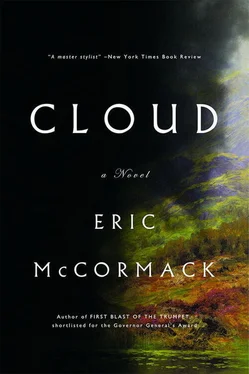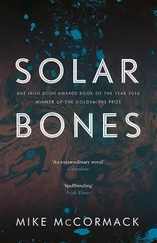“Well, well,” she said, in that same meditative way. “What a very pleasing interior architecture. Caverns: unusually capacious. Nostrils: narrow and absolutely symmetrical. Olfactory bulb: globose and delicate as could be wished. How paradoxical that the deviation of the septum has had no effect on the inner harmony.” She put her flashlight back in her pocket, smiling admiringly at my nose. “All in all,” she said, “a most instructive first inspection.”
By now I really was curious about her findings.
“Now remember, I can’t be definitive, but I’m willing to pass an informed opinion,” she said. “ Physically , you have nothing whatever to worry about concerning your nose. All the parts are in exceptionally good order and will continue to be of service throughout your life. If, as we believe, a healthy nose is an excellent predictor of longevity, you will certainly live to at least three score years and ten — accidents aside, of course.”
I supposed that was good news. Dr. Chafak had more to say, however.
“But psychologically , what your nose tells me is another matter.” She considered her words carefully. “The interior and the exterior are in surprising conflict with each other. You remember I noted that extreme aridity of the outer skin? Yet the inner surface is totally humid and lubricious. What this generally implies in an individual is extreme difficulty in reconciling conflicting elements of the psyche.”
This sounded to me as vague as the horoscope section of a newspaper. But she was obviously serious, and what she said next caught my attention.
“Within the last year, you’ve apparently suffered a great emotional shock,” she said in a gentle voice. “On the one hand, you’ve had to deal with the death of at least one of those you loved most. But your condition has been exacerbated by something else, almost certainly an affair of the heart.”
On hearing this I was, to put it mildly, surprised. I’d told Dr. Chafak nothing whatever about the deaths of my parents, and certainly not about Miriam Galt.
“You see, the first thing I noticed,” she went on, “was that the interior veins of the exumenta, which were already quite fragile, have slight ruptures in them. In my experience, it takes the double emotional trauma of a death and a tragic love affair to cause this kind of damage.” She looked at me with great compassion. “I’d guess it’s because of these things you’ve wandered so far from your native land.”
She asked for no confirmation from me and I volunteered none.
“But there is very good news, too,” she said. “Those inner vestibulants are already healing noticeably. In other words, you’re gradually getting over your emotional hurt. Your mind may not be fully aware of that yet, but your nose is.”
With those consoling words, the session was over. As Dr. Chafak was showing me to the door, Pongo the dog rose from his rug and hobbled along at her side.
“Pongo used to act as a guard dog when I had to treat violent inmates from the prison,” she said. “Now he’s just a pet.” She fondled his ears.
Pongo then came to me, sniffed at the back of my hand, then licked it. I made some comment about the infallibility of a dog’s nose.
“That’s true,” she said. “But who knows what a dog’s thinking? When the prison was still in operation, he’d sometimes lick the hands of monsters.”
I thanked her for seeing me and went outside. I walked fast all the way back to the Charybdis but not fast enough to outpace the stinging flies and mosquitoes.
FIRST MATE PRADHAN was at the top of the gangway, waiting for me.
“Well, what did you think of her?” he said. “I presume she insisted on analyzing your nose? Was it illuminating?”
I answered somewhat vaguely. Then he told me about his own experience with Dr. Chafak and about her analysis of his nose.
“She claimed my nose indicated that no medicine would do my ulcer any good if I didn’t really want to be cured,” he said. “Have you ever heard such nonsense?”
Of course, I nodded sympathetically.
AT TEN THE NEXT MORNING, the Charybdis sailed out of Isla Perdida. Aside from the stevedores who cast off our lines, the islanders paid no more attention to our departure than they had to our arrival. Having already resumed my major duty of swabbing the deck, my work took me alongside two big wooden crates that had been loaded at the island and were tied down on the foredeck. The canvas shroud on one of them flapped loosely, so I was able to see these words stencilled in large block letters:
SMITH’S
HYDRAULIC PUMPS & VENTILATOR SYSTEMS
CAMBERLOO
CANADA
Camberloo? Wasn’t that the name of the university where Dupont had studied for his medical degree? How curious it was to see, stencilled on this wooden box on the deck of a rusty freighter in the middle of a southern ocean, the name of the Canadian town I’d first heard from Dupont’s lips. What a small and strange world.
DURING THE FOLLOWING weeks, as the Charybdis made its slow and steady way towards La Guaira, the seaport of Caracas, I made my own way slowly and steadily towards a decision regarding my future: that when we reached port, I would retire from the life at sea. It had been enjoyable in some ways, but its rituals were too confining. By definition a sailor touches only the margins of the real world. I felt I was now ready for the hinterland.
Accordingly, I warned the bosun I’d be signing off at La Guaira. He was grateful for the courtesy. Crew members would often just quit without notice, giving him problems in finding replacements.
“It’s a pity you’re leaving,” he said. “You’ve got the makings of a real sailor.”
First Mate Pradhan and his wife were sorry to see me go, too, and I felt sad about that: they’d been very kind to me. Some of the first mate’s sadness was no doubt on behalf of The Ulcer, which had been like a silent fourth guest at all our meals.
The night before we sailed into La Guaira, we shared a farewell dinner and talked about what I might do ashore.
“Your money won’t last long, you know,” said the first mate.
“So you should find some useful work quickly,” said Mrs. Pradhan. “If you don’t find something that keeps your mind occupied, you’ll start moping. That’s the problem with life at sea — it gives you too much time to think.”
She was referring, of course, to my tragic love affair. I didn’t dare tell her that now sometimes when I tried to remember Miriam’s face, it almost completely evaded me.
“There’s always a need for English-language tutors,” said the first mate.
“Srinivas is right about that,” said Mrs. Pradhan.
Why not? I thought. After all, I’d almost become a teacher once before, in another world, in what seemed another century. Maybe I’d give it a try.
And, indeed, after a few restless, lonely days in a cheap Caracas hotel room, I ventured out and managed to get myself hired on a three-year contract as an English tutor with InterMinas, a big mining conglomerate. My job was to travel to the sites of various mines and teach advanced English to Spanish-speaking mine managers and supervisors. They already knew fundamental English but needed to improve their skills to communicate better with their mainly gringo owners and the big investors who occasionally flew down from the north to inspect their fiefdoms.
Those hours of class preparation I’d done at Duncairn and never used now proved useful.
The mines themselves were often located in the most inhospitable areas of the southwest, where jungle ran into mountain. The scorching sun, drenching rains, and hostile insects together made life especially hard for the mine workers.
Читать дальше











